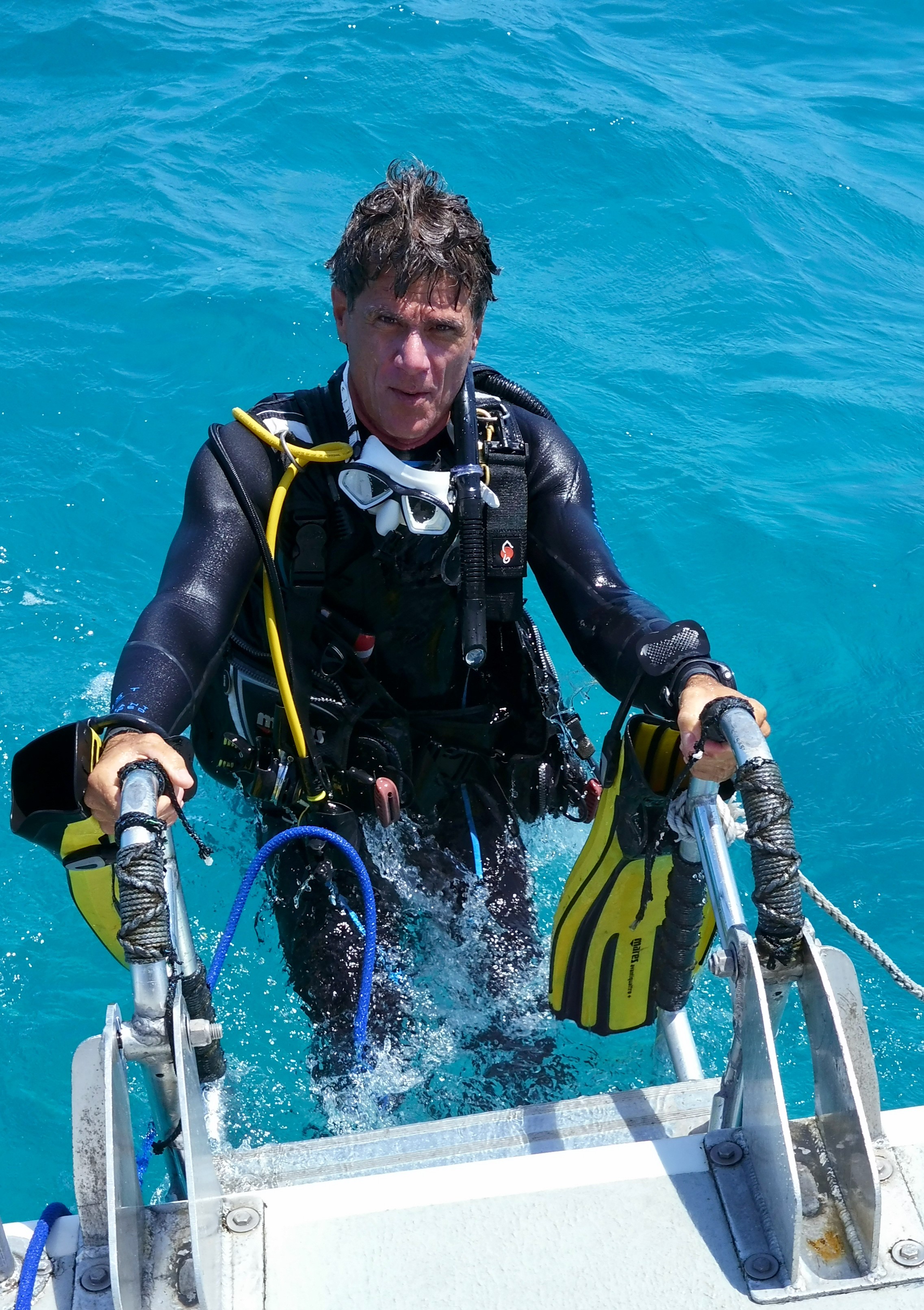Mike Goldberg, '85, Rebuilds Coral Reefs and Turns Scuba Divers into Citizen Scientists
By Lia Kizilbash Gillet

Mike Goldberg, ’85, is proof that it's possible to follow your passion and make a difference in the world—or, in his case, the planet.
An avid scuba diver, Goldberg witnessed firsthand the declining coral reefs as owner of Key Dives, a scuba dive charter business off the coast of the Florida Keys. Today, as co-founder of I.CARE (Islamorada Conservation and Restoration Education), he is rebuilding the coral reefs by turning recreational scuba divers into citizen scientists.
Since 2021, over 3,000 recreational divers have been trained and educated through I.CARE’s programs and have planted over 15,000 corals.
“Coral restoration is a relatively new science,” said Goldberg. “We are always learning from our successes and failures. We monitor 100% of every coral we plant at intervals of one week, one month and one year for survival and growth. We also do full reef monitoring to document the impact restoration has on invertebrates, fish populations and the overall health of the sea floor.”
Goldberg’s scientific understanding evolved after meeting I.CARE co-founder, Dr. Kylie Smith, in 2017. Smith often visited Goldberg’s dive shop, and he began to ask questions about the state of the coral he was observing while out on his dives.
“Over half of all oxygen on our planet comes from our oceans,” Goldberg said. “And the ocean’s health is directly tied to the existence of our coral reefs. Thirty percent of marine life is found in coral reefs, and globally, we have lost over fifty percent of our coral. With ocean temperatures increasing, our remaining reefs are in peril. We don’t know what will happen if the earth’s most biodiverse ecosystem collapses, and I don’t want to find out.”
Goldberg and Smith explored different ideas by continuing their conversations and leveraging their individual strengths and knowledge—Goldberg of recreational diving and Smith as a scientist. They landed on the strategy of using the large number of people already visiting Goldberg’s charter business to inform, educate and help rebuild the reefs. The only thing missing was the actual coral.
The two approached the Mote Marine Laboratory, a marine scientific organization. After receiving Mote Marine Laboratory’s support and partnership to supply coral, Goldberg and Smith applied for and received permits from the National Oceanic and Atmospheric Administration and the Florida Wildlife Conservation Commission. I.CARE was officially born.
“The reefs in the Keys used to be the best in the hemisphere,” said Goldberg, whose dive charter business is now entering its 21st year. “My life goal is to set the coral reef on a path toward a better state, one that is self-perpetuating.”
Growing up in a coastal town outside Los Angeles, California, and Waukegan, Illinois, Goldberg attended NIU thinking he wanted a career in marketing or finance. After graduating, Goldberg worked for Bear Stearns and Kemper Financial for 12 years.
“I truly enjoyed my time in the business world, but I was just not completely fulfilled,” he said. “At NIU, I realized that if I want anything worthwhile, it will take dedication and a ‘never give in’ attitude.”
In his early 30s, Goldberg became a dive instructor and, shortly after, moved to the British Virgin Islands and worked in the dive industry with his wife, Marcia. They set out to learn the industry and later moved to Islamorada, a Florida Key, and opened Key Dives. In addition to running the scuba dive charter side of the business, Goldberg coordinates with groups, universities, dive clubs, and more, to integrate their programs with I.CARE’s reef restoration activities.
Recently awarded CNN Hero for 2023, Goldberg hopes to continue to raise awareness so that individuals know how they can take an active role in rebuilding a vital ecosystem for future generations.
“Aside from visiting our website to learn more or coming to dive with us, there are little things everyone can do in their daily lives that have an impact,” said Goldberg. “Pesticides, weed killers and fertilizers all eventually lead to the ocean. These chemicals destroy coral reefs. Find one of the many alternatives. Reduce or eliminate single-use plastic. The energy to produce them, the energy to recycle them, the energy to transport them to a landfill all increase greenhouse gases. The increased greenhouse gasses are directly linked to climate change. Even the most ardent who denied climate change finally have recognized this link. You can either accept this link and do nothing, or join me and be a part of the solution.”
“Here is the mantra you should instill:
REFUSE, RETHINK, REDUCE, REUSE, and lastly, RECYCLE.”
Goldberg says I.CARE is planning to conduct greater ecosystem restoration over time. To help reduce algae cover, they plan to enhance sponge populations through restoration and invigorating herbivore populations. Currently, he is organizing the largest reef and shoreline clean-up event in Florida’s history, with two days of debris collection from sunrise to sunset.
“At this point of my life I consider myself a conservationist,” he said. “I was able to redirect my business to being a vessel for conservation, and it is an absolute joy to see young people excited about diving while expanding their minds. I was set to retire several years ago but just could not turn my back on the ocean that afforded me such a wonderful life.”
Click here to learn more about I.CARE and coral science, or click the image below to watch Goldberg on CNN Heroes.

